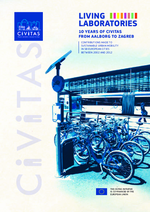
Gdansk (Poland)
Gdansk has a thousand-year history at the crossroads of important commercial and communication routes. The city is the largest city in the Pomerania region of northern Poland with about 458,000 inhabitants and 262 km2. As the economy is booming and people are moving to the suburbs, Gdansk is anxious to contain the traffic from private cars in the city.
Gdansk’s extensive port and distinct mercantile traditions add to the city’s flair of a meeting place for different cultures, nationalities and denominations. The city is the birthplace of the ‘Solidarity’ movement that was sparked under the leadership of Gdansk political activist Lech Walesa and played a key role in bringing an end to Communist rule across Central Europe. The city is a popular tourist destination attracting millions of Polish and other Europeans to its beautiful beaches along the Baltic coastline.
Gdansk is one of the largest Polish transport nodes of international significance. The city was a member of the Hanseatic League and remains a major shipping port and shipbuilding centre until today. The city’s economy is currently undergoing structural changes. Together with the nearby port of Gdynia, Gdansk forms an important industrial centre. Food processing, petrochemical and chemical industries are the dominant sectors
Gdansk has been putting a lot of effort into the expansion of its cycling network that now covers 50 kilometres. The city is the starting point of the EuroVelo 9 cycling route that goes all the way to the Adriatic Sea to Pula, Croatia. The city is working on a mobility plan that looks into modernising trams and bus services, improving the safety and security on roads and public transport, as well as traffic management to reduce congestion in the city centre. The trend of people moving to the suburbs increases the mobility demand in the city.
As part of CIVITAS MIMOSA, Gdansk promotes more tram travel and develops innovative promotional tools, such as web-based social networks and campaigns. A particular challenge the city wants to address is to reduce reliance on private cars. It aims for a 15 percent modal shift from private to public transport. Intelligent transport surveillance systems are introduced to curb vandalism in public transport vehicles by 40 percent and are hoped to lift passengers’ feeling of security by 20 percent. Cycling lanes are remodelled to half the accident rate and make cycling safer.















